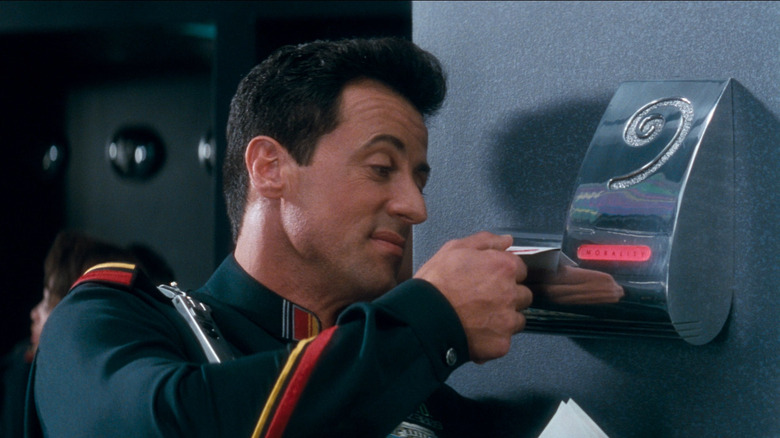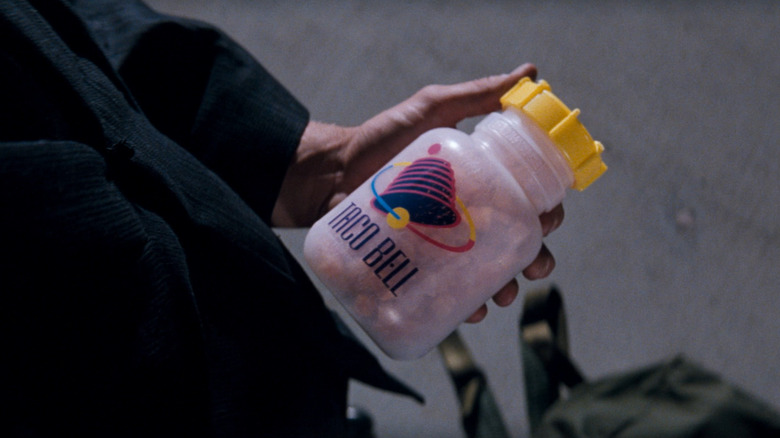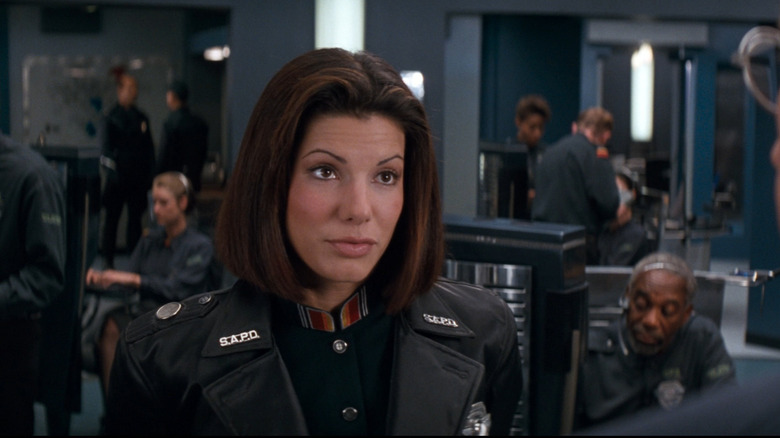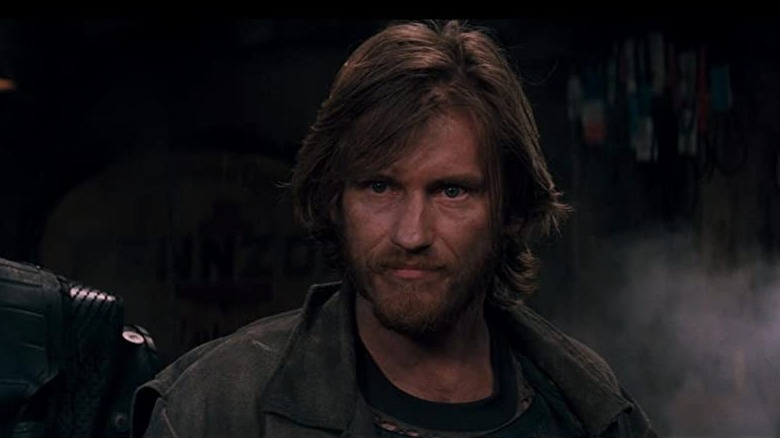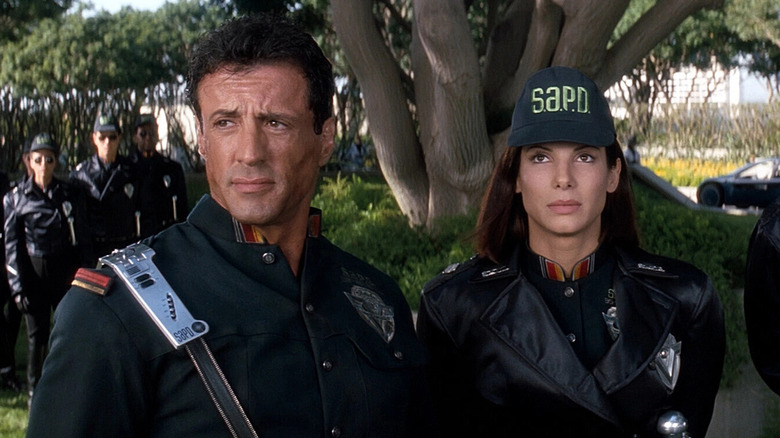Demolition Man's Sexless Corporate Dystopia Is Our Sexless Corporate Dystopia
Imagine a future without violence, without disease, without much in the way of fear or worry. Now imagine that the future can only exist if people give up almost everything that makes life worth living. That's what happened in Marco Brambilla's 1993 science fiction action flick "Demolition Man," which stars Sylvester Stallone as John Spartan, a cop they call the Demolition Man because of his penchant for causing serious collateral damage, who ends up in a cryo-prison after an arrest goes horribly wrong. When Simon Phoenix (Wesley Snipes), a super-criminal from the 20th century, is defrosted and escapes his parole hearing, the future cops thaw Spartan to try and bring him to justice. Spartan and Phoenix both come from an anarchic, violent time, and neither can fit into the sterile "utopia" they find themselves in.
San Angeles, the southern California mega-city that has replaced Los Angeles, Santa Barbara, and San Diego in 2032, is part of this banal brave new world, where everything from spicy food to swearing is illegal. Not only that, but late-stage capitalism has forced such extreme competition that there were actual Franchise Wars that lead to a total unification of restaurants under one corporation. Screenwriter Daniel Waters, who rewrote the script already worked on by Robert Reneau and Peter M. Lenkov, never intended for "Demolition Man" to be prophetic, but sadly, it's more relevant than ever in 2023.
Toxic positivity and Taco Bell everything
In the bizarre future of "Demolition Man," everything in San Angeles has been sanitized thoroughly. Pandemics of various kinds led to a ban on physical contact and any fluid exchange (that includes kissing, much to Spartan's disdain), and anything considered "bad for you" has been outlawed. When Spartan swears while he's being debriefed at the police station, he's given a citation from a machine on the wall that fines him for breaking a ban on vulgarity. He ends up swearing repeatedly in order to use the paper citations for toilet paper (which has been replaced by three seashells) and realizes that the future is polite to the point of being completely puritanical. In the face of this ultimately boring "utopia," Spartan jokes that he wants to be put back into deep freeze, and it's hard to blame him. Not only are the rules in this world unbearably strict, but any concerns about it are brushed away with toxic positivity.
Information kiosks welcome people with boundless compliments like "you look great today!" and "you give me happy joy-joy feelings," and everyone is unsettlingly upbeat all the time. They're even downright giddy about the fact that all restaurants are now Taco Bell (or Pizza Hut, if you watch the international release), which is kind of scary even if you love the Bell. The idea of even the fanciest dinner being Taco Bell is kind of bizarre, but it's a pretty good representation of corporate buyouts and mergers that create conglomerates a few companies own everything. It's not hard to see the correlation to our own news and media landscape, where parent companies control huge swaths of the industry through their subsidiaries, a true monopoly would just be one step further.
Sexless, sterile, and strictly controlled
What's wild about the future of "Demolition Man" is that it's the kind of future no one really wants. It's easy to joke that the clean, politically-correct sort of censorship is "the future Liberals want" while it's just as easy to joke about a police state being "the future Conservatives want," but I don't think anyone looks at "Demolition Man" as inspiration for an ideal future. Even if you hate swearing, love Taco Bell, and don't really care about spicy food, smoking, or alcohol, there's also that whole "no touching" thing. That goes for private situations too, which just seems terribly lonely. No hugs? No high-fives? What kind of world is that?
In one of the movie's weirdest scenes, Lenina Huxley (Sandra Bullock), a future cop with an obsession with 20th-century history tries to help Spartan acclimate, and invites him back to her apartment to have sex. She then proceeds to put on some weird headgear and puts a matching hubba-hubba hat on Spartan. He freaks out and she explains that no one actually has sex anymore and that any procreation is done via lab, and that's only if you get a license for pregnancy first. While we're not quite to that level of puritanical weirdness, things have been taking a turn toward the sexless in entertainment. Not only are LGBTQ+ characters and relationships heavily censored in family fare, but sex scenes are becoming surprisingly rare in big-budget pictures. By making sex and sexuality increasingly taboo, we're taking a huge step backward, towards a dumb, "Demolition Man"-style dystopia.
A rebellion of personal freedom
Among the things that "Demolition Man" accurately predicted are self-driving cars, a global pandemic leading to some seriously weird social changes, and a nationwide ban on abortion, but it also accurately predicts that not everyone will go along with totalitarian rule, and some people won't be allowed into a "perfect" society. These outcasts all live in "the wasteland," an underground city of its own full of people just trying to scrape by. They're led by Edgar Friendly (Dennis Leary), who wants to fight to free San Angeles and bring the people of the wasteland above ground. The corporate overlords in charge of San Angeles want Friendly dead, which is why they unfroze Phoenix, and Spartan has to rescue him.
Friendly goes on a classic Leary rant about what he wants in life, and it's hard not to agree with some of it:
"Cause I like to think, I like to read. I'm into freedom of speech and freedom of choice. I'm the kind of guy who wants to sit in a greasy spoon and think, 'Gee, should I have the T-bone steak or the jumbo rack of barbecued ribs with the side order of gravy fries?' I want high cholesterol. I want to eat bacon, butter, and buckets of cheese, okay? I want to smoke a Cuban cigar the size of Cincinnati in a non-smoking section. I wanna run through the streets naked with green Jello all over my body reading Playboy magazine. Why? Because I suddenly might feel the need to."
Friendly wants total freedom for himself but doesn't understand how that might impede on others, which is its own kind of problem. So what's a man from the past to do with these future problems?
Absolutes suck, absolutely
The best way to actually help people and ensure their happiness is a middle ground between the full-on freedom-fest of the wasteland and the strict rules of San Angeles, which is the conclusion the characters come to after defeating the evil corporate overlords. Absolutism in any form is a problem because it lacks the nuances of the human condition. Sure, banning smoking for everyone ensures there's no secondhand smoke for anyone and helps with health concerns, but it's also taking away people's personal choices about what to do with their own bodies. Friendly's desire to be able to smoke anywhere is also a problem because he's impeding on the freedoms of people who want to be able to breathe fresh air. In the fight between personal freedoms and what's best for everyone as a group, there has to be a middle ground that protects the vulnerable while still allowing people to have their own bodily autonomy.
"Demolition Man" is a silly action movie, but it was inspired by Aldous Huxley's "Brave New World," and has some surprisingly smart ideas baked inside its ridiculous outer shell of goofy jokes and Rob Schneider. (What is it with Stallone sci-fi movies from the '90s and Schneider?!) At one point we might have gotten a "Demolition Man" sequel starring Meryl Streep as Spartan's daughter, and while it's a shame we didn't, there's no time like the present, right? Otherwise, we might actually end up living our own version of the movie come 2032.
